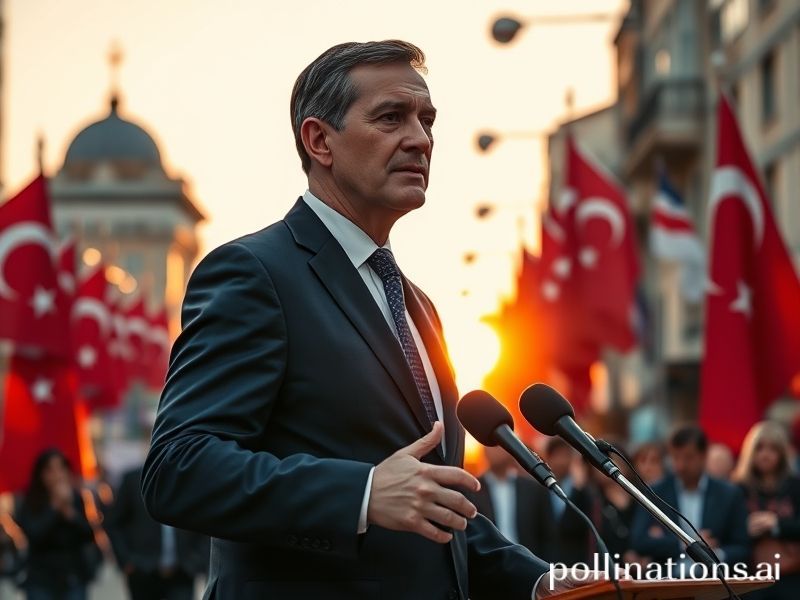Gürsel Tekin: The World’s Longest-Running Dinner Guest in Turkey’s Political Feast
The Man Who Forgot to Leave the Table
A Global Postcard on Gürsel Tekin and the Art of Permanent Opposition
ISTANBUL—Somewhere between the baklava and the bitter coffee, Gürsel Tekin has been sitting at Turkey’s political banquet for so long that the waiters have started calling him “furniture.” Forty-odd years in the opposition CHP, and he still hasn’t picked up the check—an achievement that, in most democracies, would qualify as either heroic endurance or clinical procrastination. From Brussels to Brasília, observers watch him the way one watches a glacier in a tuxedo: majestic, slow, and faintly ridiculous, yet capable of carving entire valleys if left unattended.
Tekin’s latest encore—announcing yet another “grand coalition of conscience” to unseat President Erdoğan—landed in Western newsrooms with the enthusiasm usually reserved for a sequel no one asked for. European editors yawned, American cable hosts Googled “CHP who?”, and Asian markets barely blinked, proving once again that Turkish opposition politics travels about as well as unrefrigerated seafood. Still, the symbolism is delicious. Here is a man whose career is a living museum piece of 20th-century social democracy, now trying to sell NFTs of Atatürk’s hat to Gen Z voters who communicate exclusively in TikTok hand gestures.
Globally, Tekin matters precisely because he refuses to matter enough. While strongmen from Caracas to Cairo consolidate power by rewriting constitutions between breakfast tweets, Tekin’s strategy is a nostalgic slideshow: town-hall meetings, railway inaugurations, earnest leaflets that double as origami in bored constituents’ pockets. It is democracy as performed by your favorite high-school history teacher—equal parts pedagogic and pathetic—reminding the planet that not every authoritarian tide is met with a guillotine; some are met with a polite cough and a request to turn to page 47 of the parliamentary agenda.
Investors from Frankfurt to Singapore, ever hungry for geopolitical tea leaves, parse Tekin’s every grimace for signs of Turkish lira stability. Each time he pledges to “defend the republic’s founding values,” the lira wobbles like a drunk tightrope walker, proving that markets have the emotional maturity of a teenager who just discovered Nietzsche. Meanwhile, arms exporters in Eastern Europe quietly toast Tekin’s longevity: an opposition that never quite wins is the next-best thing to a guaranteed customer for tear-gas canisters and water-cannon spare parts.
Yet there is a darker punchline. In an era when democracies outsource their backsliding to algorithms and oligarchs, Tekin’s stubborn analog presence is almost endearing—like finding a rotary phone in a 5G showroom. His persistence suggests that liberalism’s last stand may not be a heroic charge but a sit-in protest where someone forgot to bring snacks. The world’s autocrats study him the way virologists study a benign strain: useful for calibrating just how much dissent can be tolerated before the petri dish boils over.
International human-rights NGOs, perennially underfunded and overstretched, treat Tekin as a convenient screensaver: a flickering reminder that Turkey hasn’t fully succumbed to sultanism, even if the pixels are getting fuzzy. His face pops up in donor slideshows between Rohingya testimonies and Sudanese hunger stats—proof that somewhere, somehow, a secular Turk is still shouting into a microphone that isn’t state-issued.
So what does Gürsel Tekin export to the wider world? Not policy innovation—his economic platform could be photocopied from a 1973 German coalition paper. Not charisma—he has the oratorical flair of a parking meter. What he offers is a rare commodity in 2024: the spectacle of futility as moral theater. While other nations binge-watch coups and constitutional cannibalism, Turkey streams the slower drama of a man who keeps knocking on a door that may no longer have hinges.
In the end, Tekin’s global significance lies in his insignificance—a living rebuttal to the notion that all political narratives must culminate in triumph or tragedy. Sometimes they just culminate in another Tuesday. And perhaps that is the most subversive act of all: refusing to leave the table long after dessert has been served, insisting that the bill is still negotiable, even as the restaurant changes owners, the currency collapses, and the waiters start speaking an entirely new language.
Bon appétit, planet Earth. The coffee’s getting cold, but Gürsel is still ordering refills.







